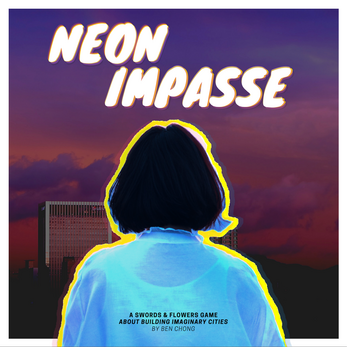I’m on a study project to improve my understanding of roleplaying games. To this end, I already have two reading projects, A Game Per Year and An Adventure Per Year. This is the third, with the goal of reading or playing 52 games made in the last few years. Originally I considered making this “A New RPG Per Week” and that’s where the number 52 comes from, even though a weekly schedule is probably not within my abilities.

Neon Impasse is the fourth itch.io game I’ve read. Like the others, it has a strong, interesting concept and fresh mechanics that act more as imaginative prompts than hardcore systems.
A Malaysian game about exploring and building a city, Neon Impasse is striking in the way it combines elements from roleplaying games, larp and alternate reality games. It presents an update on the old art of the flâneur and gives the tools to experience your city as a new place.
The game can be played alone or in a group. It involves a series of scenes that you engage with as you walk in the city after nightfall. It’s a structured guide to engaging with the concepts presented by a physical urban environment and building them into a new fictional whole. As you play, you create a another city on top of the real one.
Aesthetically the game is both specific and universal. The designer Ben Chong writes that his city is Kuala Lumpur but the game would work perfectly well in my city of Helsinki, despite the differences between these two urban environments.
The game has been written as a tribute and companion to the album Neon Impasse by the artist City Girl. The album and the game connect closely, lending the experience specificity.
My favorite detail in the game is the character creation inherent in the first scene. The game doesn’t feature an explicit system for character creation but in the first scene you leave a place. You take a look back and start making up the story based on what you see.
As you make up a city you’ll also flesh out your own relationship to it and thus sketch out fiction that starts to change your own role.